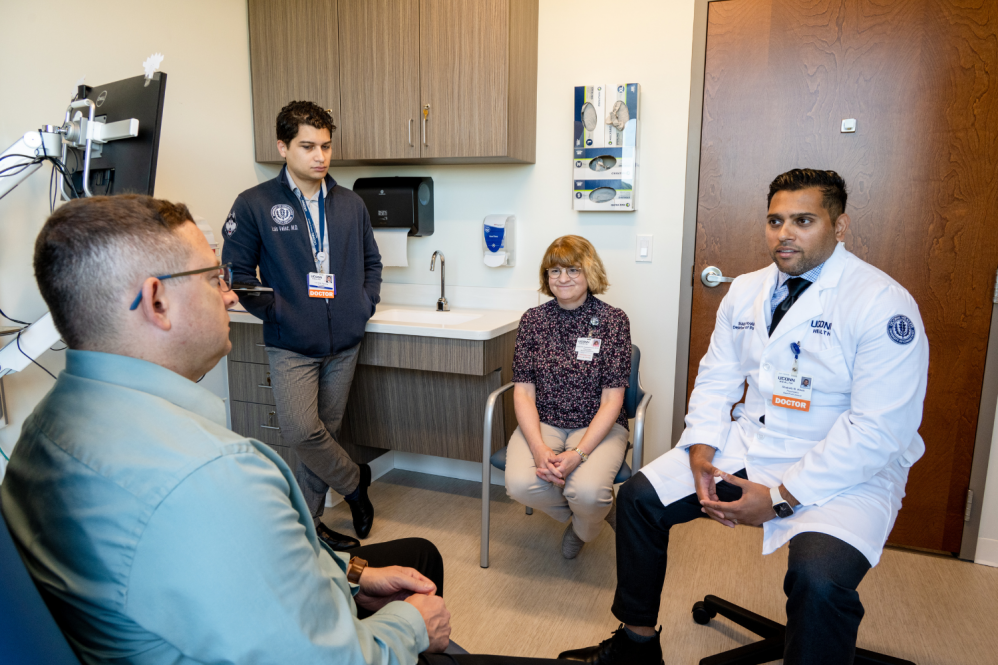The program provides multidisciplinary care, education, and research for individuals and families affected by Huntington's disease.

Dr. Shakaib Khan and his team.
Huntington's disease (HD) is a rare, inherited neurodegenerative disorder that slowly robs individuals of movement, memory, and mental health. Caused by a genetic mutation, each child of an affected parent faces a 50 percent chance of inheriting the condition. Symptoms can appear at any age, even in children, and the disease progresses unpredictably making every diagnosis deeply personal and uniquely challenging.
Patients often experience involuntary movements, cognitive decline, and psychiatric symptoms such as depression, anxiety, irritability, psychosis, and/or apathy. The emotional toll is profound: families may watch multiple generations face the disease, and patients are at increased risk of suicide at two critical points – when they receive a positive test result and as they begin to lose independence.
As Connecticut's only Huntington's Disease Society of America (HDSA) Center of Excellence, UConn Health provides comprehensive, multidisciplinary care for patients and families. Neurologists, psychiatrists, social workers, and other specialists meet with patients in a single, coordinated clinical visit and come together afterward to create a unified care plan. This approach ensures that treatment for motor symptoms, mental health, and cognitive changes work together.
"Patients don't just see a doctor," says Dr. Shakaib Khan, medical director of the Huntington's Disease Program. "They see an entire care team that knows them, knows their families, and follows them over the years. It's a lifeline."
In recognition of its excellence, UConn Health's Huntington's Disease program was nationally honored by the HDSA in both 2024 and 2025. These awards highlight the program's innovative and coordinated approach in addressing every aspect of patient care while reducing the burden of multiple appointments. Patients have shared how meaningful this model has been for their care experience that is streamlined, supportive, and comprehensive.
Beyond clinical care, UConn Health is advancing research through its participation in Enroll-HD, the world's largest observational study for Huntington's disease. This year, the program launches Enroll-HD 2.0, which aims to enroll more patients in the earliest stages of the disease, even those without major symptoms yet. The goal is to gather data that can help researchers identify earlier intervention points and eventually test disease-modifying therapies.
Currently, no cure or disease-slowing treatment exists for Huntington's, though promising trials, including some that deliver medication directly into the brain, are underway worldwide. UConn Health is well positioned to bring such studies to Connecticut patients, who are often eager to participate in research after witnessing the disease's impact on their families.
UConn Health's Center of Excellence also works closely with the Connecticut Chapter of the HDSA, recently recognized as National Chapter of the Year. This past June, the UConn team joined families, advocates, and researchers at the annual HDSA Convention in Indiana, where the Connecticut Chapter received the award.
The Connecticut HDSA Chapter hosts educational programs, fundraisers like Music on the Vine, and outreach events. Families are able to connect to resources and care with participation from the UConn Health team.
The team will present its latest research this fall at the Huntington's Study Group annual conference, with three accepted scientific posters. They remain committed to combining expert care, groundbreaking research, and strong community support to improve the lives of patients and families facing Huntington's disease.
"Even though there is no cure today," Khan emphasizes, "there is hope and there is help. Patients and families don't have to face this disease alone."






